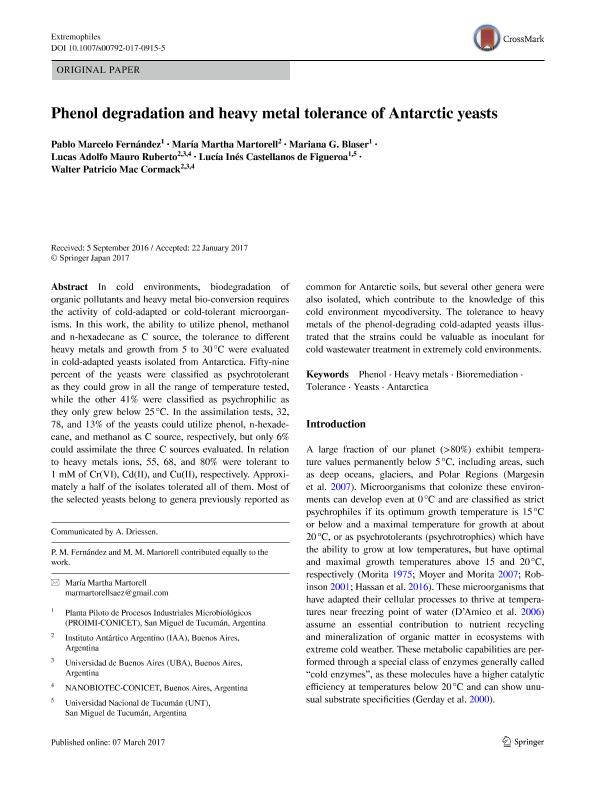Artículo
Phenol degradation and heavy metal tolerance of Antarctic yeasts
Fernandez, Pablo Marcelo ; Martorell, María Martha
; Martorell, María Martha ; Blaser, Mariana G.; Ruberto, Lucas Adolfo Mauro
; Blaser, Mariana G.; Ruberto, Lucas Adolfo Mauro ; Castellanos, Lucia Ines
; Castellanos, Lucia Ines ; Mac Cormack, Walter Patricio
; Mac Cormack, Walter Patricio
 ; Martorell, María Martha
; Martorell, María Martha ; Blaser, Mariana G.; Ruberto, Lucas Adolfo Mauro
; Blaser, Mariana G.; Ruberto, Lucas Adolfo Mauro ; Castellanos, Lucia Ines
; Castellanos, Lucia Ines ; Mac Cormack, Walter Patricio
; Mac Cormack, Walter Patricio
Fecha de publicación:
05/2017
Editorial:
Springer Tokyo
Revista:
Extremophiles
ISSN:
1431-0651
e-ISSN:
1433-4909
Idioma:
Inglés
Tipo de recurso:
Artículo publicado
Clasificación temática:
Resumen
In cold environments, biodegradation of organic pollutants and heavy metal bio-conversion requires the activity of cold-adapted or cold-tolerant microorganisms. In this work, the ability to utilize phenol, methanol and n-hexadecane as C source, the tolerance to different heavy metals and growth from 5 to 30 °C were evaluated in cold-adapted yeasts isolated from Antarctica. Fifty-nine percent of the yeasts were classified as psychrotolerant as they could grow in all the range of temperature tested, while the other 41% were classified as psychrophilic as they only grew below 25 °C. In the assimilation tests, 32, 78, and 13% of the yeasts could utilize phenol, n-hexadecane, and methanol as C source, respectively, but only 6% could assimilate the three C sources evaluated. In relation to heavy metals ions, 55, 68, and 80% were tolerant to 1 mM of Cr(VI), Cd(II), and Cu(II), respectively. Approximately a half of the isolates tolerated all of them. Most of the selected yeasts belong to genera previously reported as common for Antarctic soils, but several other genera were also isolated, which contribute to the knowledge of this cold environment mycodiversity. The tolerance to heavy metals of the phenol-degrading cold-adapted yeasts illustrated that the strains could be valuable as inoculant for cold wastewater treatment in extremely cold environments.
Palabras clave:
Antarctica
,
Bioremediation
,
Heavy Metals
,
Phenol
,
Tolerance
,
Yeasts
Archivos asociados
Licencia
Identificadores
Colecciones
Articulos(SEDE CENTRAL)
Articulos de SEDE CENTRAL
Articulos de SEDE CENTRAL
Citación
Fernandez, Pablo Marcelo; Martorell, María Martha; Blaser, Mariana G.; Ruberto, Lucas Adolfo Mauro; Castellanos, Lucia Ines; et al.; Phenol degradation and heavy metal tolerance of Antarctic yeasts; Springer Tokyo; Extremophiles; 21; 3; 5-2017; 445-457
Compartir
Altmétricas



